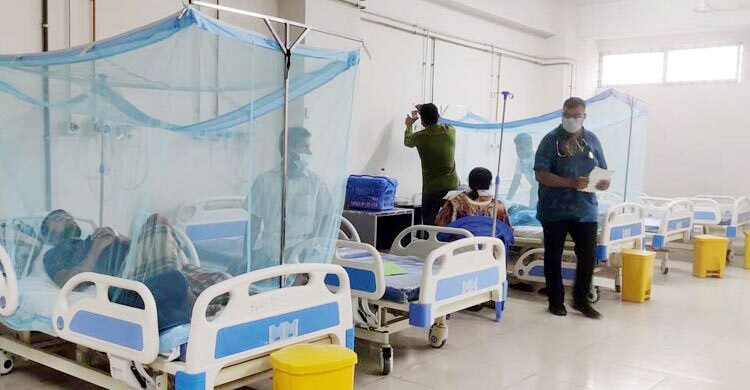Dengue situation turning alarming; Dhaka sees half of nationwide cases


Fifty percent of the total hospitalised Dengue patients are from the two city corporations of Dhaka followed by Chattogram and Barishal, according to the Directorate General of Health Services (DGHS).
According to DGHS, the dengue season began in July this year, resulting in 12 deaths and 2,669 infections. In August, the situation worsened, with 27 fatalities and 6,521 new cases. In the current month, the total number of dengue cases has reached 26,555, with the death toll climbing to 138.
From January 1 to September 25, among the 138 dengue-related deaths, 52.2% were women and 47.8% were men.
Prof. Kabirul Bashar, a Zoology professor at Jahangirnagar University, warned that the dengue situation is likely to worsen without special measures. "People are dying every day," he said.
"We have been warning for two months that the situation would deteriorate in September, but no one paid heed. Apart from regular operations, there has been a lack of targeted action during this peak period."
He noted that almost every year, a team from the health department reviews the dengue deaths. The primary goal of this review is to assess each case and determine ways to lower the mortality rate.
However, he expressed uncertainty about how much these death review reports are shared with researchers or policymakers. He emphasized that this information and data could significantly contribute to reducing the future mortality rate of dengue.
To effectively control dengue, he urged for evidence-based integrated mosquito management strategies and a shift from a job-oriented to a service-oriented mindset among responsible agencies.
“Under hotspot management, crash programs should be done within 200 meters of houses where there are dengue patients. Flying Aedes mosquitoes and larvae must be destroyed,” the expert suggested.
Visiting Dhaka’s Mugda Medical College and Hospital, it was found that these hospital have been struggling to accommodate the dengue patients and setting up additional beds on the corridors to provide treatment.
So far this year, approximately 2,000 patients visited the hospitals, with about 100 currently receiving treatment. The majority of these patients reside in Dhaka, specifically in areas such as Maniknagar, Basabo, Golapbagh, Dakshin Mugda, Mirpur, and Manda.
A similar scenario was seen at Dhaka Medical Hospital, Kurmatola General Hospital, Sir Salimullah Medical College, Mitford Hospital, DNCC Dedicated Covid-19 Hospital, and Suhrawardy Hospital, where dengue cases are increasing each day.
A. F. Hassan Ariff, adviser to the Ministry of Local Government, Rural Development and Cooperatives and the Ministry of Land, said instructions were given to all city corporations and municipalities to combat the spread of dengue by regularly monitoring and eliminating mosquito breeding grounds.
The adviser said, "Whenever dengue cases rise, we respond with various activities. However, if proactive measures are taken from the beginning and we raise awareness early on, we can significantly reduce dengue spread."
According to the local government department, efforts to prevent dengue nationwide have included the destruction of mosquito breeding grounds and the application of larvicide in 906 locations.
On Wednesday, inspections were carried out at 18,733 sites across the country, with 508 of those in City Corporation areas and 74 identified as vulnerable municipal areas, where action has been taken.
To combat the dengue outbreak this season, 2,689 mosquito control workers are actively engaged in all city corporations and at-risk municipalities.
In an emergency meeting, the local government department formed 10 teams to address the ongoing dengue situation. The program is being implemented and closely monitored in 12 City Corporations, including Dhaka South and North, as well as high-risk areas like Savar, Dohar, Tarab, and Rupganj.
DSCC Administrator Dr. Mohd Sher Ali said regular larviciding and adulticiding efforts are in place to control dengue by eliminating Aedes mosquito larvae and targeting adult mosquitoes. Besides, special mosquito control activities are conducted based on the reports of dengue patients admitted in various hospitals in the area, as provided by the Health Department, he said.
The DNCC administrator also said three monitoring teams from the local government department, along with 10 teams of DNCC officials, are conducting on-site inspections of larvicidal activities.
These inspections are carried out in two phases: the first from 7am to 10am and the second from 4pm to 6pm across the ten regions, he added.
According to DGHS, the dengue outbreak in Bangladesh began in 2000, affecting a total of 244,246 people and resulting in 853 deaths by 2022.
Last year, 1,705 people lost their lives due to dengue, making it the deadliest year in the country’s history.
